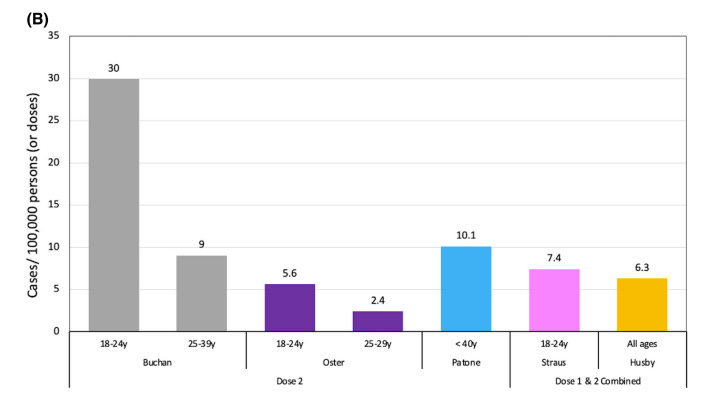Covid vaccines and myocarditis
Much of what you see on the internet about the harms of Covid vaccinations is nonsense that’s put out by grifters.
There’s a lot of money to be made persuading people that Covid vaccines are bad and that you have a treatment, a detox, or some other magical concoction that cures Covid and prevents vaccine related adverse events.
Most of the people talking about harms of the spike protein or sudden death risk associated with the vaccine aren’t actually making money off of this - they just have literally no idea what they’re talking about.
And so while it’s really easy to just dismiss the potential of risk associated with mRNA vaccination because most of it is being shouted by jackasses who don’t know anything about anything, it’s also wrong to skip a risk-benefit discussion in favor of an indefinite parade of boosters.
Let me be clear - I think that the mRNA vaccines for Covid might be the biggest scientific miracles that the world has ever seen
That’s not an exaggeration. There’s nothing hyperbolic about recognizing the absolutely amazing nature of these interventions.
Covid vaccines have saved millions of lives.
They’re actual miracles that have prevented a lot of human suffering.
And I think it’s totally justifiable that the companies who invented them have been rewarded with billions of dollars.
I lined up to get mine the first day that it was offered to me (I received Moderna). I would do it again in a heartbeat knowing what I know now.
But knowing what I know now, I probably also would have waited a bit longer before I got my second dose of the vaccine.
And so when I weigh the risks and benefits of additional vaccination doses for me, my family, and my patients, I take into account what I’ve learned (and seen) about the side effect profile and effectiveness.
When it comes to Covid as well as Covid vaccination, age really matters
There’s been so much written about the things that make Covid outcomes worse.
It’s true that people who are chronically sick have a higher chance of getting really sick or dying from Covid.
And while it’s really easy to blame poor metabolic health, diabetes, or whatever else for a lot of the Covid-related suffering that we’ve seen, they aren’t really the main players.
The most important thing that drives risk of a bad outcome from Covid infection is age - the elderly are most vulnerable here.
And so while vaccination status, obesity, heart disease, and other medical comorbidities matter for risk of a bad outcome from Covid, the thing that really matters most is age:

Age matters for the vaccine too: there’s an undeniable signal for vaccine related myocarditis in young men receiving their second Moderna dose
Every medical intervention has side effects. Even the miraculous ones.
Just like the risk of a bad outcome with Covid infection has differences based on who is infected, the risk of a bad outcome with Covid vaccination differs based on who is vaccinated.
The biggest myocarditis risk related to vaccination comes from a second dose of the Moderna vaccine in young men.
One of the arguments that was made early on in the pandemic is that Covid carries a risk of myocarditis and so vaccination still makes sense even if there’s a signal for adverse events.
It’s accurate that Covid has a myocarditis risk, but to make this a compelling argument, you really need to quantify the impact here.
It turns out that a man under 40 has a much higher risk of myocarditis from a second dose of a Moderna vaccine than he does from natural Covid infection:
The same risk is not seen for woman in this age range, where the risk of myocarditis is about equal with second Moderna dose compared to Covid infection:
And when it comes to those over 40, Covid infection has a much higher myocarditis risk than vaccination does:
Further separating the age range suggests that younger people have greater myocarditis-related vaccine risk, so we shouldn’t think of a 21 year old the same way we think of a 39 year old, even though they’re both under 40:
What are the implications of myocarditis risk?
Understanding the risk-benefit discussion has implications when you think about policy moving forward.
When it comes to Covid vaccines, the most important thing that we can do is to understand who is at higher risk from actual infection, because that helps to simplify the risk-benefit conversation.
The older you are, the more benefit.
The younger you are, the lower the benefit.
Which is the exact opposite of the way that risk works - older people are are lower risk and younger people are at higher risk.
That’s why carrying out high quality clinical trials matters when you’re thinking about vaccination policy - if you can’t quantify both the risks and the benefits, you can’t figure out who has a net positive and who has a net negative.
And we didn’t even get into stratifying by prior natural infection versus without a prior natural infection, which is an entirely different set of quantitative challenges to sort out.
But I’m not a policy maker, I’m a doctor. And so when I counsel my patients on this, I think about the individual - how old you are, how many medical problems you have, your sex, and whether you’ve had a Covid infection - so that I can try to make the medical advice as personalized as possible.
That’s all for today’s newsletter, but I have more to say on Covid boosters that I’ll get to next week.







